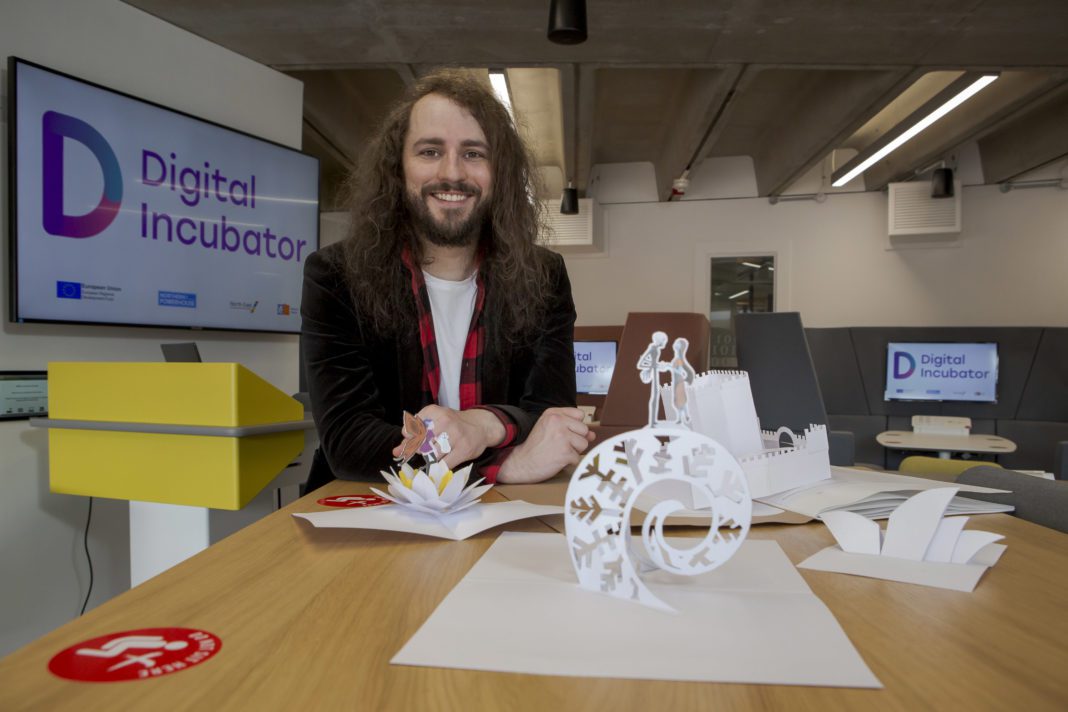David James Green is one talented individual – not only is he a classically trained singer, plays over 10 musical instruments, is a seasoned woodturner, leather crafter and product designer, but he’s also now turning his attention to paper engineering.
Creating everything from children’s toys and games, to shop stands that neatly fold away once used, similar to pop-up picture books – David believes the engineering technique will grow in popularity into the future as our living environments become smaller and we’re looking to create more space.
Paper engineering uses physical science and life sciences in conjunction with mathematics, converting raw materials into useful paper products.
To help David on his exciting venture, the University of Sunderland is providing the 27-year-old with support and funding through its Digital Incubator programme, after recognising the skills the student has demonstrated since beginning his Master’s Degree in Design.
The Digital Incubator supports Sunderland students and graduates with digital skills to explore the possibility of working for themselves as freelancers.
David’s talents in design are made even more remarkable, as he manages his workload while dealing with several health conditions including seizures and blackouts, before being diagnosed with Postural tachycardia syndrome (PoTS) an abnormal increase in heart rate that occurs after sitting up or standing. Some typical symptoms include dizziness and fainting.
He’s now managing to control his seizures since his diagnoses with medication and says he’s now in a much better place.
“I’ve been thinking about going self-employed for a while due to my health. Sometimes I would black out for multiple hours a day, so it looked like I would be unable to work. However, since getting better and starting my Masters Degree, one of my tutors recommended the Digital Incubator and it has really helped me to focus on where I’m going and the direction that my business will take,” explained David, from Sunderland.
He added: “I primarily work with paper engineering and pop-up mechanics. For example, I’ve designed a display unit that pops up in less than a minute and uses much less material than the current standard, so it’s sustainable too.
“At the same time, my Masters is focused on making children’s toys which use pop-up book technology.
“I was inspired to get into this field after I did a project where I designed furniture for micro flats, while studying my undergraduate degree at Teesside University.
“Everyone is now getting access to less and less space, especially when renting. Sometimes you have families with two or three kids in a space less than 36sqm and that’s becoming more common. From there I got the idea of designing children’s toys like dolls houses and castles, because that’s what my mum built for me and my sister when we were growing up. But they’re big space commitments.”
Asked where he gets his ideas from, David says he’s always had a creative mind and believes his Autistic Spectrum Disorder, which was only diagnosed at age 19, plays a part in the creative process. He has sung professionally in cathedrals across the country, and has a Royal School Church Music Gold Award, and plays over 10 instruments to Grade 5 level, including Grade 8 level violin. He has even been wood-turning and carving since the age of 13.
“I just love to create, an idea pops up in my brain and it’s great to see what develops, I can literally design anything!” says David.
As part of the Digital Incubator, students and graduates have the opportunity to use the hot-desk facilities of the Incubator, which will include access to technical equipment and software to enable students to develop their skills and work on live projects with clients.
Working with external partners, The Digital Incubator delivers workshops, mentoring and networking opportunities to enable students to develop essential enterprise and employability skills.
Paul Graham, Senior Lecturer University Enterprise Zone Digital Incubator said: “David has been a member for six months and has really worked hard on his business and has attended over 50 hours of workshops so far.
“These workshops support our members on topics such as opening a business bank account, writing a business plan, understanding emotional intelligence to how to pitch for work.
“Currently, the Digital Incubator has over 50 members who have all been supported online due to the current pandemic which includes support from a mentor working with David closely on his products.”
Paul added: “David has gained funding from the Digital Incubator and Santander Bank and is now actively looking for commission from businesses who would like fold-away models of their buildings or company headquarters created.”
As well as business support, David is also the proud recipient of a Gold Sunderland Professional Award (SuPA).
SuPA is part of the University of Sunderland’s pledge to create work-ready students. The awards recognise students who have made the most of their time at university, achieving work experience or part-time work or volunteering, developing of transferable and employability skills.
Asked what his top tip for pitching to the Digital Incubator is, David said: “Know your topic inside and out. Be confident and be yourself. You don’t need to know exactly what you want to do or where your business is going. As long as you’ve got a good idea and the drive and passion to set it up, then the Digital Incubator is there to help you.”
For more information for students and graduates to become a member of the digital incubator or for clients to access the range of members for work please contact the digital incubator at digitalincubator@sunderland.ac.uk
David’s story comes as Universities UK launches #GettingResults – a campaign demonstrating how universities are at the heart of the economic and social recovery from the pandemic.
















